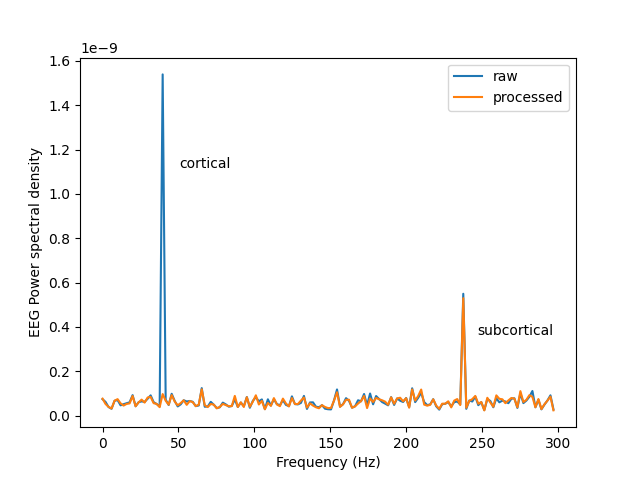Note
Click here to download the full example code
Cortical Signal Suppression (CSS) for removal of cortical signals#
This script shows an example of how to use CSS [1] . CSS suppresses the cortical contribution to the signal subspace in EEG data using MEG data, facilitating detection of subcortical signals. We will illustrate how it works by simulating one cortical and one subcortical oscillation at different frequencies; 40 Hz and 239 Hz for cortical and subcortical activity, respectively, then process it with CSS and look at the power spectral density of the raw and processed data.
# Author: John G Samuelsson <johnsam@mit.edu>
import numpy as np
import matplotlib.pyplot as plt
import mne
from mne.datasets import sample
from mne.simulation import simulate_sparse_stc, simulate_evoked
Load sample subject data
data_path = sample.data_path()
subjects_dir = data_path / 'subjects'
meg_path = data_path / 'MEG' / 'sample'
fwd_fname = meg_path / 'sample_audvis-meg-eeg-oct-6-fwd.fif'
ave_fname = meg_path / 'sample_audvis-no-filter-ave.fif'
cov_fname = meg_path / 'sample_audvis-cov.fif'
trans_fname = meg_path / 'sample_audvis_raw-trans.fif'
bem_fname = subjects_dir / 'sample' / 'bem' / '/sample-5120-bem-sol.fif'
raw = mne.io.read_raw_fif(meg_path / 'sample_audvis_raw.fif')
fwd = mne.read_forward_solution(fwd_fname)
fwd = mne.convert_forward_solution(fwd, force_fixed=True, surf_ori=True)
fwd = mne.pick_types_forward(fwd, meg=True, eeg=True, exclude=raw.info['bads'])
cov = mne.read_cov(cov_fname)
Opening raw data file /home/circleci/mne_data/MNE-sample-data/MEG/sample/sample_audvis_raw.fif...
Read a total of 3 projection items:
PCA-v1 (1 x 102) idle
PCA-v2 (1 x 102) idle
PCA-v3 (1 x 102) idle
Range : 25800 ... 192599 = 42.956 ... 320.670 secs
Ready.
Reading forward solution from /home/circleci/mne_data/MNE-sample-data/MEG/sample/sample_audvis-meg-eeg-oct-6-fwd.fif...
Reading a source space...
Computing patch statistics...
Patch information added...
Distance information added...
[done]
Reading a source space...
Computing patch statistics...
Patch information added...
Distance information added...
[done]
2 source spaces read
Desired named matrix (kind = 3523) not available
Read MEG forward solution (7498 sources, 306 channels, free orientations)
Desired named matrix (kind = 3523) not available
Read EEG forward solution (7498 sources, 60 channels, free orientations)
MEG and EEG forward solutions combined
Source spaces transformed to the forward solution coordinate frame
Average patch normals will be employed in the rotation to the local surface coordinates....
Converting to surface-based source orientations...
[done]
364 out of 366 channels remain after picking
366 x 366 full covariance (kind = 1) found.
Read a total of 4 projection items:
PCA-v1 (1 x 102) active
PCA-v2 (1 x 102) active
PCA-v3 (1 x 102) active
Average EEG reference (1 x 60) active
Find patches (labels) to activate
all_labels = mne.read_labels_from_annot(subject='sample',
subjects_dir=subjects_dir)
labels = []
for select_label in ['parahippocampal-lh', 'postcentral-rh']:
labels.append([lab for lab in all_labels if lab.name in select_label][0])
hiplab, postcenlab = labels
Reading labels from parcellation...
read 34 labels from /home/circleci/mne_data/MNE-sample-data/subjects/sample/label/lh.aparc.annot
read 34 labels from /home/circleci/mne_data/MNE-sample-data/subjects/sample/label/rh.aparc.annot
Simulate one cortical dipole (40 Hz) and one subcortical (239 Hz)
def cortical_waveform(times):
"""Create a cortical waveform."""
return 10e-9 * np.cos(times * 2 * np.pi * 40)
def subcortical_waveform(times):
"""Create a subcortical waveform."""
return 10e-9 * np.cos(times * 2 * np.pi * 239)
times = np.linspace(0, 0.5, int(0.5 * raw.info['sfreq']))
stc = simulate_sparse_stc(fwd['src'], n_dipoles=2, times=times,
location='center', subjects_dir=subjects_dir,
labels=[postcenlab, hiplab],
data_fun=cortical_waveform)
stc.data[np.where(np.isin(stc.vertices[0], hiplab.vertices))[0], :] = \
subcortical_waveform(times)
evoked = simulate_evoked(fwd, stc, raw.info, cov, nave=15)
Projecting source estimate to sensor space...
[done]
4 projection items deactivated
Created an SSP operator (subspace dimension = 4)
4 projection items activated
SSP projectors applied...
Process with CSS and plot PSD of EEG data before and after processing
evoked_subcortical = mne.preprocessing.cortical_signal_suppression(evoked,
n_proj=6)
chs = mne.pick_types(evoked.info, meg=False, eeg=True)
psd = np.mean(np.abs(np.fft.rfft(evoked.data))**2, axis=0)
psd_proc = np.mean(np.abs(np.fft.rfft(evoked_subcortical.data))**2, axis=0)
freq = np.arange(0, stop=int(evoked.info['sfreq'] / 2),
step=evoked.info['sfreq'] / (2 * len(psd)))
fig, ax = plt.subplots()
ax.plot(freq, psd, label='raw')
ax.plot(freq, psd_proc, label='processed')
ax.text(.2, .7, 'cortical', transform=ax.transAxes)
ax.text(.8, .25, 'subcortical', transform=ax.transAxes)
ax.set(ylabel='EEG Power spectral density', xlabel='Frequency (Hz)')
ax.legend()
# References
# ^^^^^^^^^^
#
# .. footbibliography::

Total running time of the script: ( 0 minutes 5.832 seconds)
Estimated memory usage: 104 MB